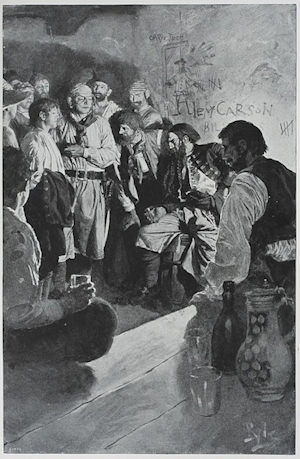 The term quartermaster can be confusing, as the meaning can vary according to the context. The quartermaster on a naval vessel stood watch next to the helmsman and was responsible for maintaining the ship’s course, whereas in armies on land, a quartermaster was an officer who supervised logistics and requisitions, managed the stores and barracks, and distributed supplies and provisions. A pirate quartermaster had numerous, less well defined responsibilities, which could vary from ship to ship.
The term quartermaster can be confusing, as the meaning can vary according to the context. The quartermaster on a naval vessel stood watch next to the helmsman and was responsible for maintaining the ship’s course, whereas in armies on land, a quartermaster was an officer who supervised logistics and requisitions, managed the stores and barracks, and distributed supplies and provisions. A pirate quartermaster had numerous, less well defined responsibilities, which could vary from ship to ship.
The term quartermaster might derive from the title of a German royal official, the Quartiermeister. This term meant ‘master of quarters’, where ‘quarters’ refers to lodgings or accommodation. Alternatively, it could have been derived from ‘master of the quarterdeck’, the deck where the quartermaster was positioned on a naval vessel. Both terms might have developed independently in the navy and army. The French and Dutch naval titles were quartier-maître and kwartier-meester.
On a pirate ship it was different. As pirates didn’t trust authority and therefore saw no reason to let all the power of a ship rest on one man, they attempted to split the power between the captain and the quartermaster. According to Charles Johnson, author of A General History of the Robberies and Murders of the most notorious Pyrates, aboard a pirate ship “the Captain can undertake nothing which the Quarter-Master does not approve. We may say, the Quarter-Master is a humble Imitation of the Roman Tribune of the People; he speaks for, and looks after the Interest of the Crew”.
 The pirate quartermaster had quite a lot of authority on a pirate ship and could even veto the captain’s decision if it went against the interests of the crew. He was roughly the equivalent of a merchant first mate or a naval first lieutenant, but, in contrast to them, could be voted in or out by the crew. He often acted as an emissary with outsiders and mediator in disputes on board the ship. He would inform the captain of the crew’s wishes and the crew those of the captain. On pirate vessels the quartermaster helped to maintain order and discipline in accordance to the pirate articles, doling out any punishments agreed on by the crew. One of his most important task was to oversee the plunder and that it was distributed fairly. He used money in the common treasury to buy supplies and weapons, and sometimes was responsible for the issuing of rations. Another of his tasks was said to be the alloting of compensation in accordance with the articles for any injuries crewmembers might have sustained. In battle he usually led the boarding of other vessels and might have succeeded the captain should he be killed in the fray. When a prize was captured, the quartermaster was often given command of it. To adequately carry out most of these tasks the elected quartermaster would have needed to have been literate.
The pirate quartermaster had quite a lot of authority on a pirate ship and could even veto the captain’s decision if it went against the interests of the crew. He was roughly the equivalent of a merchant first mate or a naval first lieutenant, but, in contrast to them, could be voted in or out by the crew. He often acted as an emissary with outsiders and mediator in disputes on board the ship. He would inform the captain of the crew’s wishes and the crew those of the captain. On pirate vessels the quartermaster helped to maintain order and discipline in accordance to the pirate articles, doling out any punishments agreed on by the crew. One of his most important task was to oversee the plunder and that it was distributed fairly. He used money in the common treasury to buy supplies and weapons, and sometimes was responsible for the issuing of rations. Another of his tasks was said to be the alloting of compensation in accordance with the articles for any injuries crewmembers might have sustained. In battle he usually led the boarding of other vessels and might have succeeded the captain should he be killed in the fray. When a prize was captured, the quartermaster was often given command of it. To adequately carry out most of these tasks the elected quartermaster would have needed to have been literate.
Not every pirate company had a quartermaster, his duties often being fulfilled by other members of the crew, and the share of plunder he received could vary, ranging from the same share as any other crewman to one and a half or even two shares. Sam Bellamy had several different quartermasters, depending on which vessel he captained, including Paulsgrave Williams and Richard Norton; Jack Rackham was Charles Vane’s quartermaster, who later became captain after Vane was accused of cowardice for refusing to attack a vessel; Ned Lowe also had more than one quartermaster during his pirating career, including John Russel and Francis Spriggs. The quartermaster of William Kidd is said to have been Hendrick van der Heul.
To find out more about pirate quartermasters watch the interesting video below by the Gold and Gunpowder YouTube channel.

One comment